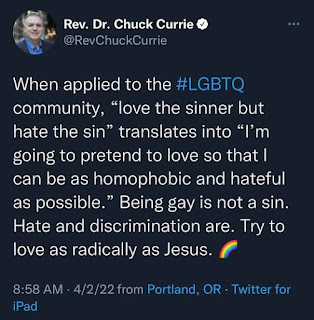Some Christian friends have connected with me to express their opposition to the LGBTQIA+ people using the rainbow symbol. These friends tell me that the rainbow was a sign given by God to demonstrate love and reconciliation and that LGBTQIA+ people have misappropriated the rainbow as a symbol.
This is painful for me to hear, but let's examine this. Large numbers of people---people of faith and others---who are waving Pride rainbow flags or wearing those buttons or stickers probably do agree with the opposition that the rainbow does signify love and reconciliation. That's their point exactly. Most everyone wants love and reconciliation of some kind, and every person needs love and reconciliation.
The crowd suggesting that LGBTQIA+ people are sinners and that their misappropriation of the rainbow invites God's harsh judgement are accepting very limited interpretations and translations of a few texts that occur in both the Hebrew and Christian bibles. It takes some work to sort that out, and most folks don't have time or patience with that, but I think that the biblical weight is on the side of justice for LGBTQIA+ people.
Let's take another path, though, since arguing over interpreting Scripture won't get us very far most of the time. Let's ask---is God still speaking or not? If He isn't, then we're back to arguing over interpreting Scripture. If He is, then we have to talk about discernment. And lots of people will tell you that they discern God's hand in movements for human rights, including the LGBTQIA+ movement.
The question of whether or not God "changes" is open to discussion. There are many places in our sacred texts where God's mind seems to change or unexpected mercies or condemnations appear. There are notable conflicts throughout and between our texts. But it cannot be argued that human beings are the same in 2022 as we were in ancient times and that different peoples will either receive different messages or will interpret what they hear differently. There is a good ayah (verse) in Surah Al-Hujurat of the Quran: "O mankind, indeed We have created you from male and female and made you peoples and tribes that you may know one another. Indeed, the most noble of you in the sight of Allāh is the most righteous of you. Indeed, Allāh is Knowing and Aware."
Do not lose opportunities to know one another.
Have our friends who oppose Pride not considered that God is too big and too great to fit into one religion? Have they forgotten that even the Christian Bible says that not everything that Jesus did or said can be contained in it because those teachings were so many and so marvelous? Have they found some other definition for "righteousness" than "justice" and "acting justly"?
That can become a political discussion pretty quickly. There is nothing wrong with mixing politics and religion---I think that God requires us to use wisdom in discerning political events and wants us to takes sides---but maybe that conversation doesn't get us very far, either, because we're coming into this on opposing sides. Please hear what I'm saying: ideas and politics matter, but when we speak of religion and politics we should be speaking of justice. So let's try studying this from another direction.
Isn't anything that detracts from love or says that God is something less than an infinite love for everyone at odds with what the peoples of the Abrahamic faiths read in our sacred texts? Yes, God has different Names and means of functioning, but is God not our Loving Parent and Creator? Do we not all of us bear the images of God and of the first human beings that God created out of clay and God's very breath? The answer has to be "yes" for people of faith. And that being the case, we are obligated to reconciliation because we share God's image and breath, our common origins, and our humanity as well.
It is an insufficient fable we spin that says "love the sinner but hate the sin." Examine your heart carefully. There is judgment buried in that trite cliché that gives you power in this world or system but that puts you at great risk before others and before God. Why? Because this is something more than an opinion or just a stand-alone cliché. It is judgement, privilege, and hypocrisy talking. Isn't it a form of exclusion, of publicly shaming someone, because of who they love and how they love?
From First United Methodist Church of Salem, OR.
Where do you start with loving another as God has told us to do? You start with letting others be themselves. This imitates God's love for us.
So when churches and other faith communities put up barriers between themselves and LGBTQIA+ people what's really happening?
Closing with some words of wisdom---practical theology---from two gay people:
Closing with some words of wisdom---practical theology---from two gay people:









No comments:
Post a Comment